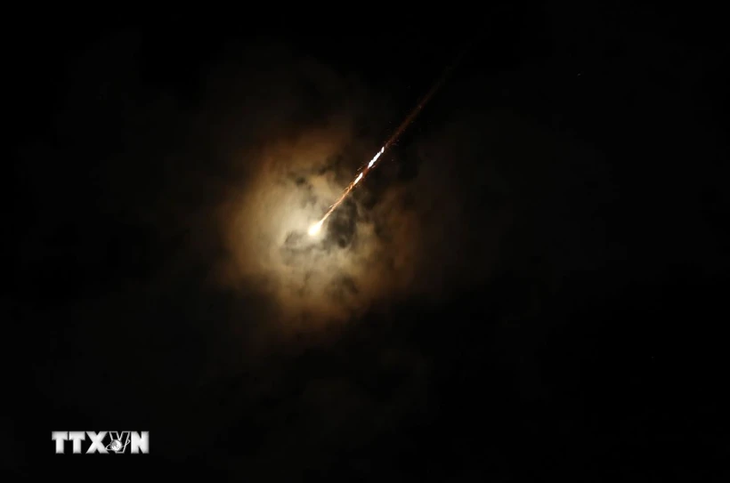(VOVWORLD) -Iran’s ballistic missile attack on Israel Tuesday sparked international concerns over escalation of tensions in the Middle East, with many countries calling for an end to military clashes that threaten regional stability.
 Projectiles from Iran to Israel intercepted by Israel fly through the sky above the northern West Bank city of Nablus, on Oct. 1, 2024. (Photo: Xinhua/VNA) Projectiles from Iran to Israel intercepted by Israel fly through the sky above the northern West Bank city of Nablus, on Oct. 1, 2024. (Photo: Xinhua/VNA) |
Iran claimed the surprise attack was in response to several recent killings by Israel, including the death of Hamas and Hezbollah leaders. Hezbollah, a close ally of Iran, suffered heavy losses in its clashes with Israel, which has also announced a ground operation targeting the militant group across its northern border into Lebanon.
Tehran has reportedly launched a total of nearly 500 missiles on Israel, with Tel Aviv vowing to retaliate.
The United Nations Secretary-General Antonio Guterres condemned the conflict escalation. "This must stop," he said, adding "We absolutely need a ceasefire."
In a statement shortly after Iran’s missile attack, US National Security Advisor Jake Sullivan said the US is working with Israel to assess the impacts. "Iran launched nearly 200 ballistic missiles towards targets in Israel. The United States military coordinated closely with the Israeli defense forces to help defend Israel against this attack. US Naval destroyers joined Israeli defense unit in firing interceptors to shoot down the inbound missiles. President Biden and Vice President Harris monitored the attack in the response from the White House situation room, joined in person and remotely by their national security team. But at this time and I stress, at this time, we do not know of any deaths in Israel. We are tracking the reported deaths."
The office of Prime Minister Keir Starmer said on Tuesday that Britain "completely condemns" Iran's actions. Earlier, Starmer had reportedly spoken to Israeli Prime Minister Benjamin Netanyahu and Jordan's King Abdullah.
The same day, France and Germany also expressed concern about an “escalation” in the Middle East.
Israel's cabinet has also convened to deliberate how to respond to Iran's missile attacks. Meanwhile, Hamas called Iran's missile attack on Israel an attempt to avenge the killing of its own leader Ismail Haniyeh and Hezbollah leader Hassan Nasrallah.